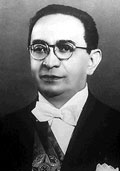João Café Filho received basic education in Natal. He never accomplished his study in the Academy of Juridical Science and Commerce of Recife, but his practical experience in law provided him with a chance to receive a job with a Natal law court. Since 1921 he worked as journalist in the states of Rio Grande do Norte, Paraíba, Pernambuco and in the capital, Rio de Janeiro. He unsuccessfully contested municipal elections and became involved in the campaign of the Liberal Alliance (1930). As a group commander, he was an active participant of the Revolution of 1930 and was named police chief of Rio Grande do Norte (1930-1931, 1932-1933). In 1933 he founded the Social Nationalist Party (Partido Social Nacionalista) and was elected to the federal Chamber of Deputies (1935-1937). Exiled to Argentina for criticizing the growing dictatorship of Getúlio Dorneles Vargas (1937), Café Filho returned the next year, but stayed politically inactive for seven years. Before the fall of Estado Novo (1945), Café Filho attempted to create a new political party, but after his failure to register it he joined the group of founders of the Republican Progressive Party (Partido Republicano Progressista, PRP). As a PRP candidate, Café Filho was elected to the National Constituent Assembly, convened on 5 Feb 1946. A merger of PRP with agrarian and syndicalist parties led to creation of the Social Progressive Party (Partido Social Progressista, PSP), whose parliamentary group was headed by Café Filho until October 1947. Political alliance of the Vargas-led Labor Party with PSP won the presidential elections of 3 Oct 1950 by a margin of more than a million votes. Vargas and Café Filho took the oath of office as president and vice president respectively on 31 Jan 1946. Café Filho disapproved some key policies implemented by Vargas, but he did not wield sufficient power to counteract them. A Vargas ally of the moment, Café Filho saw an opportunity to seize the presidency when political crisis broke out in August 1954. Acting on his own behalf, he proposed to submit resignations of both president and vice president in his address to the deputies on 23 Aug 1954. The suicide of Vargas delivered the presidency to Café. The new government inherited economic problems including high inflation rate and budget deficit. Political developments in view of the presidential elections dominated most of the short presidency of Café Filho. The election of Juscelino Kubitschek de Oliveira (3 Oct 1955) as his successor was not favored by the Café Filho administration. The military and war minister Henrique Teixeira Lott were disturbed by the rumors that the president might try to prevent Kubitschek from entering office on 31 Jan 1956. After Café Filho suffered a heart attack (3 Nov 1955), President of the Chamber of Deputies, Carlos Coimbra da Luz, temporarily assumed the presidency (8 Nov 1955). However, the Chamber of Deputies and Senate, answering to demands of the military, recognized the existence of impediment for Café Filho and Luz for continuing to discharge the functions of the president and passed the presidency to Vice President of the Federal Senate, Nereu de Oliveira Ramos (11 Nov 1955). On 21 Nov 1955 Café Filho notified both chambers of the National Congress of resuming office, but the Congress declared the continued existence of an impediment for Café Filho, thus leaving Nereu Ramos in charge of the presidency. The Congress declared a 30-day state of siege (24 Nov 1955) and the Supreme Federal Tribunal refused to allow Café Filho to exercise his functions as president, although he was never stripped of his title. The ex-president moved away from politics and worked in a real estate company in Rio de Janeiro (1957-1959). In 1961 he was made a minister of the Guanabara Court of Auditors, where he worked until 1969. [2] |
| Candidate (party) |
Popular vote (3 Oct 1950) [3] |
| João Fernandes de Campos Café Filho (Labor) |
2,520,790 |
| Odilon Duarte Braga (National Democratic) |
2,344,841 |
| Altino Arantes Marques (Social Democratic) |
1,649,309 |
| Vitorino Freire (Social Labor) |
524,079 |
| Alípio Correia Neto (Socialist) |
10,800 |
| blank |
1,048,778 |
| void |
156,392 |
|

